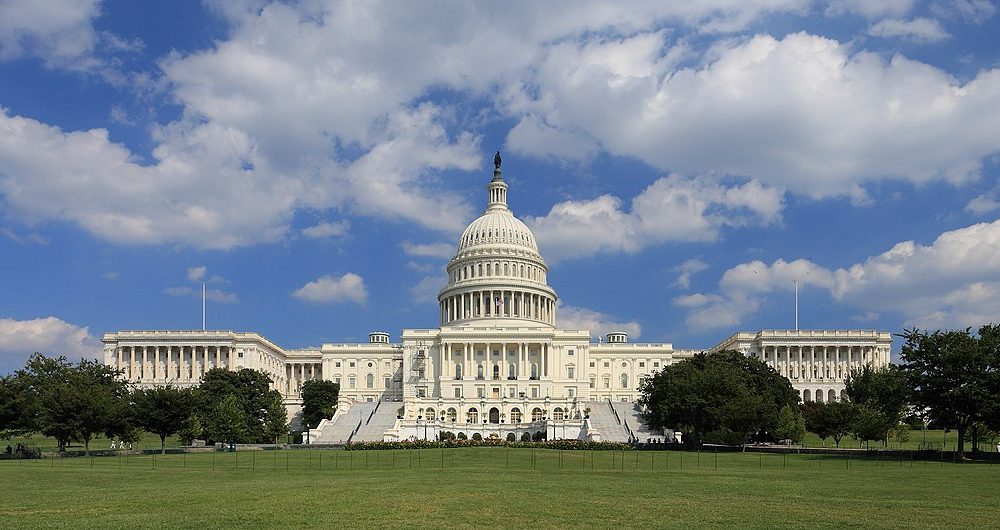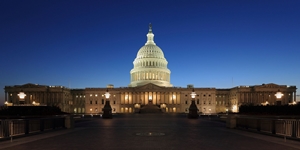
US Capitol - by Martin Falbisoner via Wikimedia Commons
On May 2, U.S. Rep. Yvette D. Clarke introduced legislation into the U.S. House of Representatives to require disclosure of political campaign content created by artificial intelligence. House Bill 3044 amends the Federal Election Campaign Act of 1971 (FECA) to […]
On May 2, U.S. Rep. Yvette D. Clarke introduced legislation into the U.S. House of Representatives to require disclosure of political campaign content created by artificial intelligence.
House Bill 3044 amends the Federal Election Campaign Act of 1971 (FECA) to provide transparency and accountability for the use of content generated by artificial intelligence (generative AI) in political advertisements. It requires such advertisements to include a statement within the contents of the advertisements if generative AI was used to generate any image or video footage in the advertisements. The bill also expands FECA’s definitions of online platform.
If passed, the Federal Election Commission (FEC) would be required to make regulations within 120 days of the day of the enactment of the bill. Additionally, the bill explicitly states the legislation would come into effect on or after January 1, 2024, even if the FEC has not yet promulgated regulations to carry out the new law.
The bill, entitled the Require the Exposure of AI–Led Political Advertisements Act (REAL Political Advertisements Act) has been referred to the House Committee on House Administration.
January 21, 2022 •
Ban Corporate PACs Act Introduced in U.S. Senate

US Capitol - by Martin Falbisoner via Wikimedia Commons
On January 20, U.S. Sen. Mark Kelly introduced the Ban Corporate PACs Act. The legislation, Senate Bill 3528, amends the Federal Election Campaign Act of 1971 to eliminate the ability of for-profit corporations to establish and manage separate segregated funds […]
On January 20, U.S. Sen. Mark Kelly introduced the Ban Corporate PACs Act.
The legislation, Senate Bill 3528, amends the Federal Election Campaign Act of 1971 to eliminate the ability of for-profit corporations to establish and manage separate segregated funds (i.e., PACs) or solicit contributions from corporate stockholders. It also requires existing corporate PACs, of a type that would no longer be permitted under this Act, be terminated and their funds be fully disbursed within one year after enactment of the Act.
December 15, 2014 •
Federal Omnibus Bill Allows Increased Political Contributions to Political Parties
With the Senate passing the House’s omnibus bill, the limits for political contributions to federal political parties will increase when President Barack Obama signs the bill. Included as a rider with House Resolution 83 is an amendment to the Federal […]
 With the Senate passing the House’s omnibus bill, the limits for political contributions to federal political parties will increase when President Barack Obama signs the bill. Included as a rider with House Resolution 83 is an amendment to the Federal Election Campaign Act of 1971 allowing additional contributions to political parties for presidential nominating conventions, for preparation for and the conduct of election recounts and contests and other legal proceedings, and for the construction, purchase, renovation, operation, and furnishing of one or more buildings for party headquarters.
With the Senate passing the House’s omnibus bill, the limits for political contributions to federal political parties will increase when President Barack Obama signs the bill. Included as a rider with House Resolution 83 is an amendment to the Federal Election Campaign Act of 1971 allowing additional contributions to political parties for presidential nominating conventions, for preparation for and the conduct of election recounts and contests and other legal proceedings, and for the construction, purchase, renovation, operation, and furnishing of one or more buildings for party headquarters.
An additional provision of the bill prohibits the federal government from recommending or requiring any entity submitting an offer for a federal contract to disclose, as a condition of submitting an offer, any political contribution, expenditure, independent expenditure, or disbursement for an electioneering communication by the offeror, its officers or directors, or any of its affiliates or subsidiaries.
Another provision included in the bill prohibits the federal government from paying for a portrait of an officer or employee of the federal government, including the president, the vice president, a member of Congress (including a delegate or a resident commissioner to Congress), the head of an executive branch agency, or the head of an office of the legislative branch.
The president has said he will sign the bill.
UDPATE: On December 16, President Obama signed the House Resolution 83 into law.
Photo of the U.S. Capitol by Martin Falbisoner on Wikimedia Commons.
February 25, 2013 •
U.S. Supreme Court Denies Review of Appeal Dealing with Issue of Federal Political Contributions from Corporations
United States v. Danielczyk
 Today the United States Supreme Court decided not to grant a review of the case of United States v. Danielczyk.
Today the United States Supreme Court decided not to grant a review of the case of United States v. Danielczyk.
Danielczyk is a criminal case in which one of the defense arguments was the Federal Election Campaign Act of 1971 prohibiting direct corporate contributions to federal candidates was unconstitutional.
The U.S. District Court Judge presiding over the case had agreed with the defense and, based on Citizens United v. FEC, found corporations have an equal right to make political contributions under federal law as do human beings. The judge’s decision was reversed on appeal. The reversal on this issue of law now stands.
August 15, 2011 •
US Bill to Reduce Power of Incumbents
Introduced by Rep. Woodall

Earlier this month, United States Representative Rob Woodall introduced House Resolution 2788 which amends the Federal Election Campaign Act of 1971 to prohibit a candidate for election to the congress from making campaign expenditures for the election from amounts that were not raised during the election cycle for that office.
Rep. Woodall argues the legislation, called the Competitive Elections Act, will reduce the power of incumbents and encourage more new candidates in Congressional elections.
Rep. Woodall said, “We see this voter frustration in all of the polls supporting term limits. Rather than amend our Constitution with term limits that protect incumbents for three, six or twelve terms, my bill restores power and choices to voters each and every term,” Woodall said. His press release can be found here.
May 27, 2011 •
Corporate Contribution Ban Found Unconstitutional
US District Court

A federal judge has ruled a section of the Federal Election Campaign Act of 1971 [FECA] prohibiting direct corporate contributions to federal candidates is unconstitutional. In United States v. Danielczyk, a criminal case being heard in the US District Court for the Eastern District of Virginia, Judge James C. Cacheris found corporations have an equal right to make political contributions under federal law as do human beings.
In the decision dismissing one of the counts against the defendants, the judge writes, “But for better or worse, Citizens United held that there is no distinction between an individual and a corporation with respect to political speech. Thus, if an individual can make direct contributions within FECA’s limits, a corporation cannot be banned from doing the same thing. So because individuals can directly contribute to federal election campaigns within FECA’s limits, and because [2 U.S.C.]§ 441b(a) does not allow corporations to do the same, § 441b(a) is unconstitutional and Count Four must be dismissed.”
Currently, during an election cycle, individuals may contribute $2,500 for a federal candidate’s primary election and an additional $2,500 for the general election.
State and Federal Communications, Inc. provides research and consulting services for government relations professionals on lobbying laws, procurement lobbying laws, political contribution laws in the United States and Canada. Learn more by visiting stateandfed.com.

